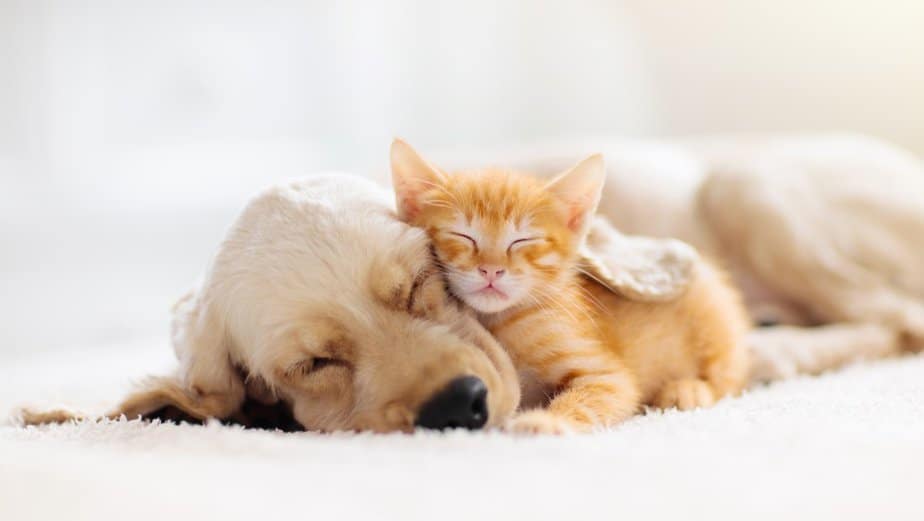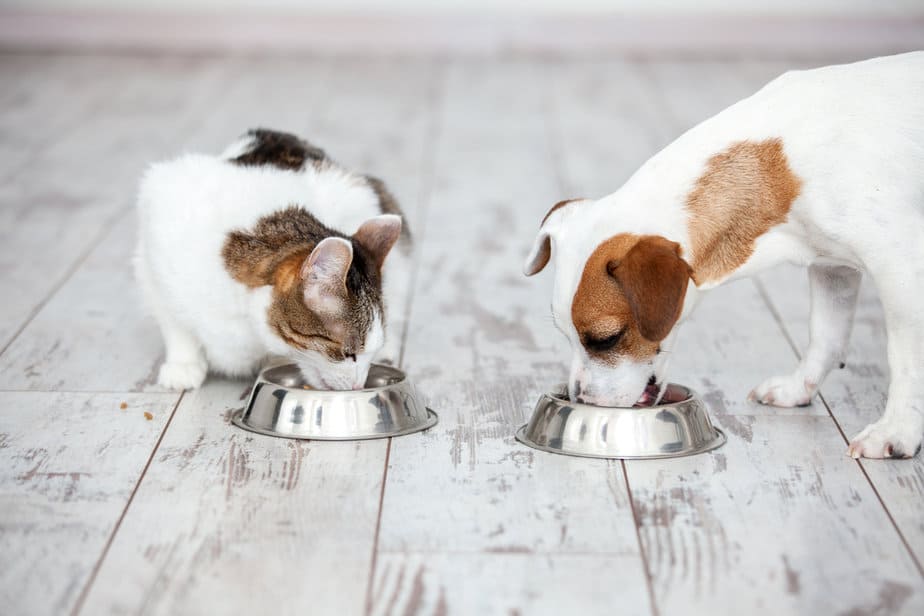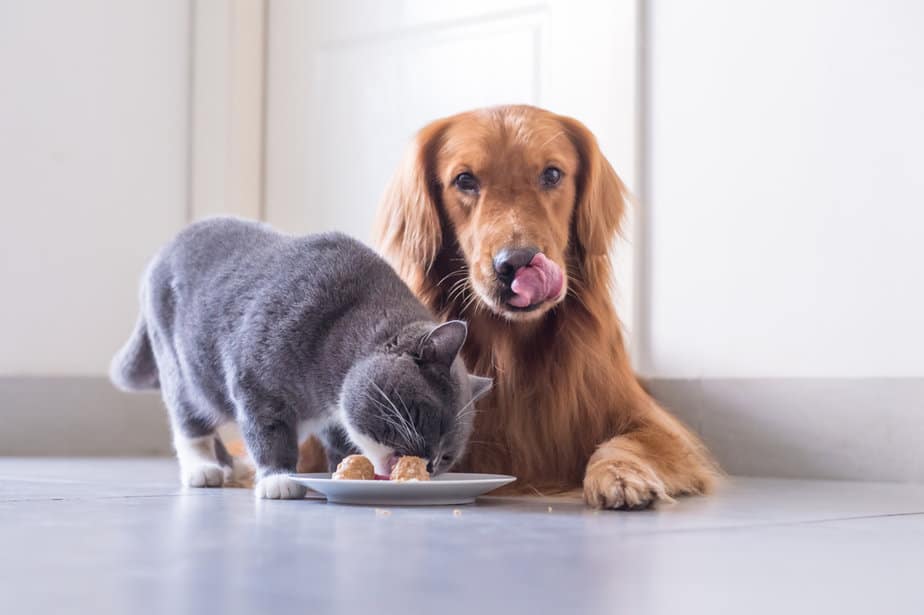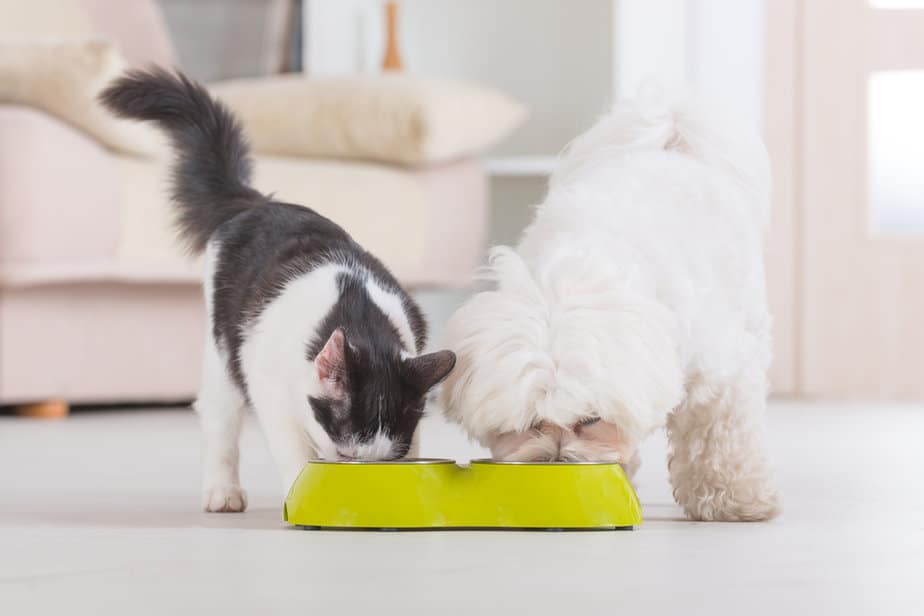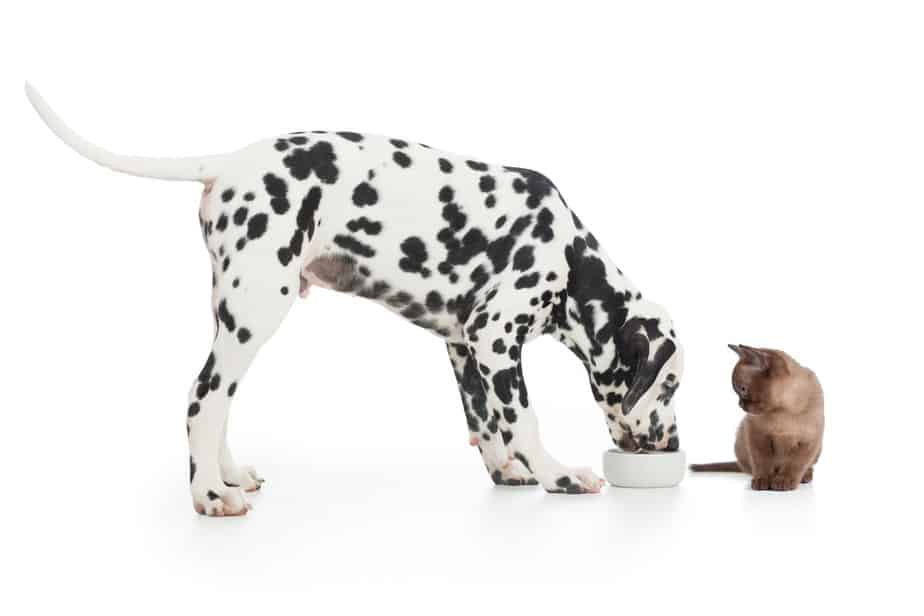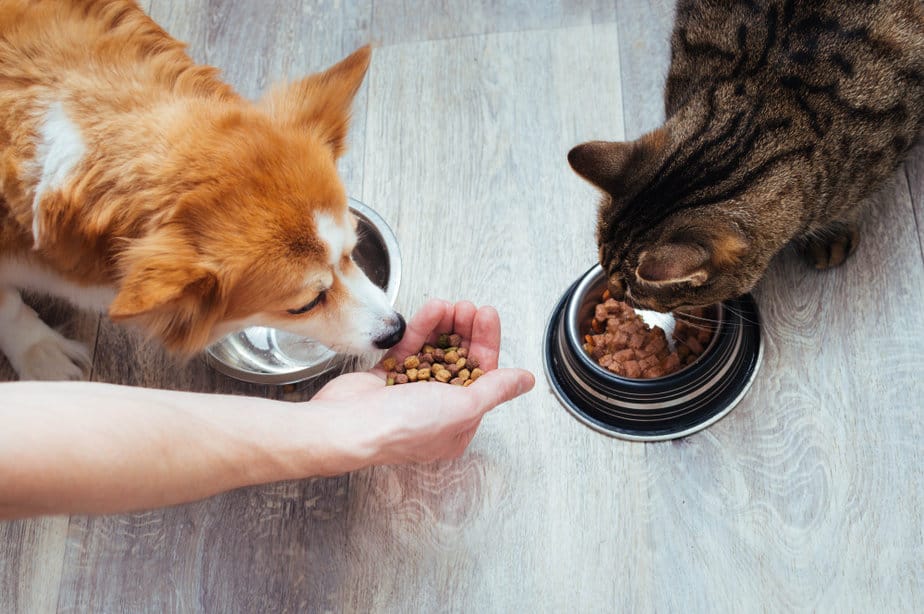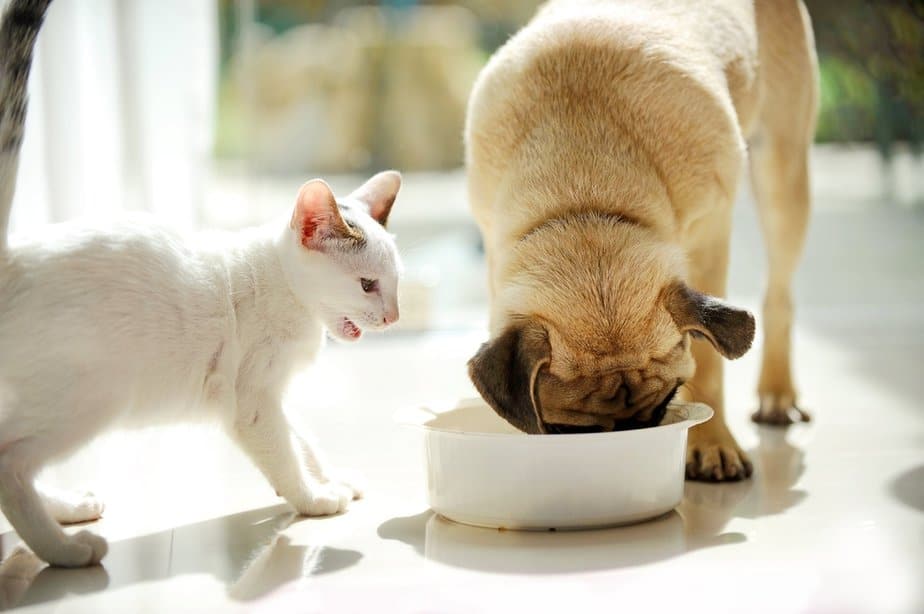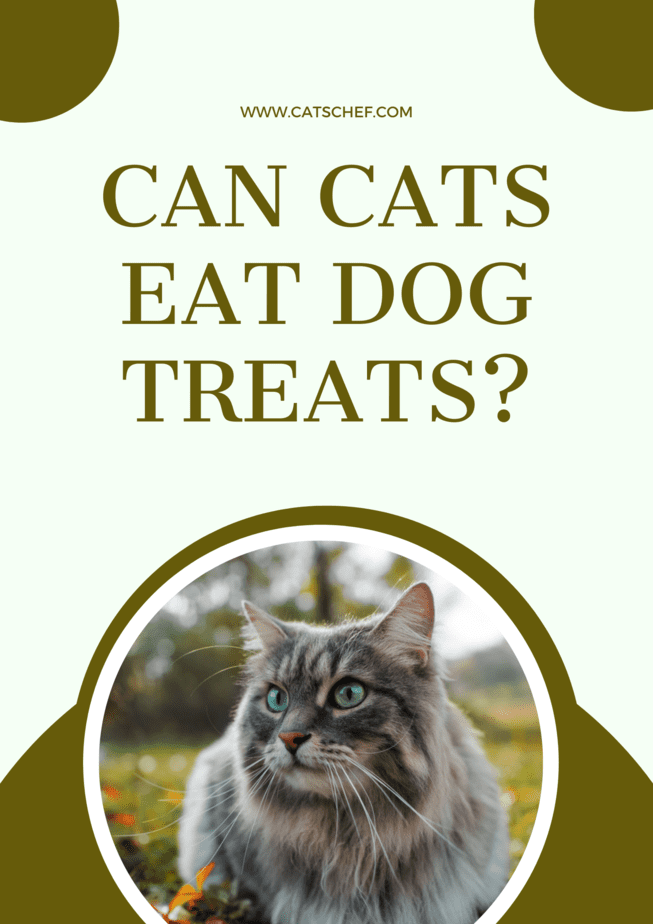📖 Table of Content:
- What’s the difference between cat treats and dog treats?
- Can cats eat dog treats, then?
- Can you replace cat treats with dog treats altogether?
- Can cats eat peanut butter dog treats?
- Can cats eat dog chews?
- What about dog biscuits?
- Can cats eat dog ice cream?
- What about Puppuccinos?
- What’s the conclusion? Can cats eat dog treats?
We can‘t stomach what we‘re about to say, but there are humans out there who absolutely adore BOTH cats AND dogs. Aren’t we supposed to choose?! Aren’t we supposed to be either cat people or dog people, not both? But, on the off chance that you are both, you might be wondering can cats eat dog treats?
Don‘t get me wrong, nobody‘s here to judge your parenting style or to question your pet‘s eating habits. Cat food and dog food do kind of look the same, have the same (gross, but probably purrfectly delectable) aroma, and taste the same (not that we‘ve ever tasted either of the two).
There’s nothing wrong with wondering whether there’s a difference between the two. Whether there’s a weird (but elaborate) marketing scheme trying to convince you that you’re a bad pet parent unless you choose the super expensive, heavily promoted, commercially available pet food.
Whether you ACTUALLY NEED cat treats that are carefully crafted to fit the nutritional needs of your purr. And whether you NEED dog treats that are designed to suit the nutritional requirements of your woof.
What’s the difference between a cat’s diet and a dog’s diet? Why do we need different kibbles, dog chews, and dog biscuits? What’s the reason why you haven’t thought of feeding your cat dog treats before? And you have to be honest with yourself, she’d be pretty pleased with dog jerky.
According to our friends over at the ASPCA (American Society for the Prevention of Cruelty to Animals), cats can eat an OCCASIONAL dog treat. We put the emphasis on the occasional because there are a couple of things to consider beforehand.
And here’s what you need to know.
What’s the difference between cat treats and dog treats?
Here’s the thing, we can’t really answer this question unless you let us take a quick glance at your pet’s pantry. The biggest difference between cat treats and dog treats (cat food and dog food) depends on the type and the brand.
Most cat treats and dog treats have INCREDIBLY similar ingredients with slightly different portions. Both of them typically contain meat (chicken, turkey, beef, or fish), fruits (blueberries, bananas), veggies (carrots, peas), and grains (wheat, corn, oats, rice).
But, when they’re choosing their own food, cats typically go for something that contains a bunch of meat because they’re obligate carnivores. Dogs, on the other hand, typically go for something that has a little bit of everything because they’re omnivores.
So, their carefully crafted pet treats typically contain more of what they naturally gravitate towards. Cat treats contain a bunch of meat and dog treats contain a bunch of peanut butter, obviously. But, does that mean that cats can’t eat dog treats?
Dog treats do come with a bunch of things your feline friend wouldn’t scoff down on a regular. But, more often than not, these things aren’t bad for her health. Blueberries, for example, can boost your cat’s immune system and promote the health of her skin and hair (Hadid, who?!).
Dog treats shouldn‘t become a regular part of your cat‘s diet (they‘re similar, not the same). But, there‘s no reason why your cat shouldn‘t have an occasional dog treat that‘s been approved by her vet (more on that later in the article).
Can cats eat dog treats, then?
One more time for the pet parents in the back, cats can eat AN OCCASIONAL dog treat. Dog foods and dog treats certainly aren’t the worst thing your four-legged friend can munch on when she needs a pick-me-up.
But, there are a couple of things you should consider before you head over to the nearest Trader Joe’s to get a bag of Happy Dog for your definitely-not-a-happy-dog cat. Don‘t shy away from throwing a glance at the ingredients list and looking for any of the ingredients we’re about to discuss.
Dog treats don’t support your cat’s nutritional needs. Your cat shouldn’t rely on them for her daily dose of fiber, protein, vitamins, minerals, and antioxidants. Consuming dog foods and dog treats on a regular can cause malnourishment and a bunch of other health problems.
1. Onion, garlic, and other Alliums
Onions, garlic, shallots, chives, leeks, and other members of the Allium family aren’t something you want anywhere near your feline friend. According to our friends over at the ASPCA (American Society for the Prevention of Cruelty to Animals), members of the Allium family contain compounds that can lead to toxicity.
What‘s the compound in question? This compound is known as an N-propyl disulfide. It is responsible for causing oxidative damage to your cat’s red blood cells and encouraging dangerous diseases such as anemia.
Don’t even get me started on the gastrointestinal upset and the obvious symptoms of onion or garlic toxicity!
Consuming even the tiniest amounts of onion, garlic, or any other member of the Allium family can cause vomiting, diarrhea, weakness, loss of appetite, loss of coordination, tremors, seizures, and even death.
Contact your vet THE VERY MOMENT you notice your cat has eaten something that contains these ingredients and keep your vet up-to-date. Onion, garlic, and other members of the Allium family are extremely toxic to cats AND dogs.
“That’s crazy! How come there are traces of these ingredients in dog food and dog treats?!” Here’s the thing, most healthy dogs can consume A LITTLE BIT of onion powder or garlic powder without experiencing repercussions.
That’s not to say that healthy cats can eat these ingredients without experiencing repercussions because they can’t. Cats are smaller than most dogs and they need smaller amounts of n-propyl disulfide to knock them down.
So, make sure your dog treats don’t contain onion, garlic, and other members of the Allium family before you offer them to your feline friend.
2. Ethylene Glycol and Propylene Glycol
First things first, what even are these two ingredients? When we’re talking about whether cats can eat dog treats, we have to consider the additives and preservatives that can be found within these treats.
Sure, certain additives and preservatives are safe for both cats and dogs (round of applause for brands that use them). But, certain additives and preservatives that can be found in dog treats can cause harm to your cat’s health when consumed over a longer period of time.
Ethylene Glycol and Propylene Glycol are additives you can find on the back of human foods (seasonings, soups, salad dressings) and dog foods (wet and dry foods). These additives are EXTREMELY TOXIC to cats and can lead to toxicity and other detrimental diseases.
Some of the most common symptoms of toxicity are weakness, depression, “out of the ordinary“ movements, “drunk“ behavior, excessive thirst and urination, cardiovascular complications, and seizures. Contact your vet as soon as you notice these symptoms or take your cat to the emergency animal center.
And, next time you’re wondering “can cats eat dog treats?” or ”can cats eat dog food?”, take a look at the ingredients list and consult with your vet. We can‘t stress this enough, never shy away from asking your vet for advice when you’re considering making changes to your cat’s diet.
3. Peanut butter
Peanut butter, really? Sure, peanut butter sounds pretty mild when compared with the “never feed this to your cat or she’s going to die” ingredients we mentioned in the previous couple of paragraphs. But, peanut butter has a way of creeping into your digestive system and giving you a surprise stomachache.
Here‘s the thing, peanut butter isn’t even toxic to cats. Actually, cats can eat peanut butter as an OCCASIONAL TREAT without repercussions.
Dogs are OBSESSED with peanut butter (you‘ve seen the TikToks, haven‘t you?). We thought we shouldn’t forget about the complicated relationship this butter shares with cats. To your cat’s disappointment, peanut butter contains a couple of things that aren’t great for your cat’s health.
First things first, peanut butter’s packed with calories and fats that can cause a bunch of digestive problems such as stomachache, weight gain, obesity, and diabetes. Nobody’s saying your chunky cat wouldn’t be cute, but her health should be your number one priority.
On the other hand, peanut butter contains Xylitol. We’ve already touched upon the dangers of additives and preservatives. You’re pretty much aware that cats shouldn’t have any of them. Xylitol can cause digestive distress, vomiting, diarrhea, and progress to kidney and liver failure.
Last but not least, peanut butter can cause allergic reactions. Swelling, skin irritations and bumps, itching, weakness, lethargy, loss of appetite, and loss of coordination are some of the symptoms of allergic reaction to keep an eye out for.
Can you replace cat treats with dog treats altogether?
Cats can eat AN OCCASIONAL dog treat (and no, we’re not getting tired of repeating that every couple of paragraphs). Dog treats are great because they contain a bunch of vitamins, minerals, and antioxidants. Cat treats don’t because cats want to munch on meat most of the time.
But, there’s always a but somewhere in there whenever we’re talking about your cat’s dietary needs. Cats are obligate carnivores which means they require meat, animal protein, and animal nutrients in their diets to survive and thrive.
They don’t require fruits, veggies, and grains the same way humans (and their best friends, dogs) do. They don’t even possess the enzymes necessary for their digestive systems to break down and process most foods humans (and dogs) eat on a regular. And they’re lactose intolerant!
Don’t even get me started on the fact that most cats can’t taste sweet things! That’s right, your cat has no business munching on blueberries, blackberries, and raspberries (other than the ridiculous amount of antioxidants, of course) when she can’t even taste them.
Blueberries won’t cause harm to your cat’s health, but who’s to say dog treats don’t contain other ingredients that will?! That’s why you have to make sure you don’t obliterate your cat’s digestive system (and her taste buds) with onions, garlic, bananas, and/or peanut butter.
And that‘s why you have to make sure your cat’s getting her essential nutrients from cat food and cat treats. Dog treats don’t contain certain vitamins, minerals, amino acids, and fatty acids she needs for a healthy and happy life (we’re talking about taurine, arginine, arachidonic acid, and vitamin A).
To your (and your cat‘s?) disappointment, you can‘t replace cat treats with dog treats every single day.
Can cats eat peanut butter dog treats?
We understand that you’re tempted to head over to the nearest trader Joe’s and buy every single one of the peanut butter and banana dog treats. But you might want to hold your horses (or hold your cats?). These treats sound DELICIOUS but they might not be the best for your cat.
So, can cats eat dog treats that contain peanut butter? Are these cat snacks safe for your feline?
Cats can’t eat peanut butter dog treats, at least not on a regular. One bite or two shouldn’t send her to the emergency animal center, but anything more than that could. Peanut butter contains too much fat and too many calories which can result in an overweight cat.
Can cats eat dog chews?
Dogs LOVE chewing on things. Nobody’s surprised that humans have developed dog treats specifically designed for the purpose of chewing. But, can cats eat dog chews? Can cats chew on things without getting hurt?
Cats can’t eat dog chews, or at least they shouldn’t. Your cat’s teeth aren’t as strong as those of a dog. Her teeth could get worn off or even broken off while she’s chewing on a dog chew.
Trust me, even the most popular dog chews out there (antlers, bones, and rawhide) aren’t safe for your furry friend.
You might want to keep a close eye on your cat when you’re letting her play with dog chews. They can easily become a choking hazard. Either way, she’s better off munching on something safer.
What about dog biscuits?
Here’s the thing, dog biscuits aren’t the worst thing your four-legged friend can scoff down when she’s feeling a bit hungry. And let‘s be honest, dog biscuits are made with protein, carbohydrates, fat, and fiber which aren’t that harmful.
Cats can eat OCCASIONAL dog biscuits as long as they’re meeting their dietary needs through cat food and cat treats 90% of the time. The other 10% we’ll reserve for treats that don’t necessarily offer much nutritional value. They shouldn’t go overboard, but a bite or two should make them feel better.
Can cats eat dog jerky?
Cats can eat dog jerky, kind of. You see, dog jerky seems to be much better for your cat’s health than other dog chews and dog treats. Your cat shouldn’t break her teeth or hurt her stomach because dog jerky’s softer and easier to digest.
On top of that, (unlike your regular beef jerky), dog jerky doesn‘t typically contain additives, preservatives, and other ingredients that can cause harm to your cat. Dog jerky’s made specifically for dogs, but cats can have an occasional bite or two without any repercussions.
Consult with your vet and check the ingredients list (just in case) before you let your cat go ham (pun definitely intended) on dog jerky.
Can cats eat dog ice cream?
“Come on, dogs get their own ice cream, too?!” That’s right, Ben & Jerry’s introduced desserts made for dogs (a dog ice cream of sorts) that have swept the feline world of their paws. These desserts are made with sunflower seed butter and a couple of other things.
They’re available in Rosie’s Batch (made with pumpkin and cookies) and Pontch’s Mix (made with peanut butter and pretzels). They sound absolutely paw-licking delicious, but can cats even eat them? They can, sort of.
Like with anything else, cats can have AN OCCASIONAL lick or two of doggie dessert ice cream. But, they shouldn’t eat this dessert as a regular part of their diet. Some of these ingredients don’t sit that great on their stomachs.
What about Puppuccinos?
“Seriously, even Starbucks makes drinks for puppies?!” Yes, even Starbucks has something called a Puppuccino, a pup cup, or simply a cup of whipped cream that can serve as a treat for your puppy. Whipped cream doesn’t sound dangerous, but can cats eat Puppuccinos?
To everyone’s disappointment, cats can’t have Puppuccinos. Cats are lactose intolerant which means they can’t digest the lactose that can be found in most dairy products. Whipped cream contains lactose, so it’s safe to say that Puppuccinos shouldn’t find their way into your cat’s stomach.
What’s the conclusion? Can cats eat dog treats?
Don’t worry, Mrs. McFluffer. Cats can have AN OCCASIONAL dog treat as long as they consult with their vet (you can do that for your cat) and avoid dog treats that can cause harm to them. Some treats are better than others so they have to make sure they choose wisely.
Dog treats can be a great way to spice things up a bit and make your cat’s (otherwise boring) mealtime a little better. Go ahead, head over to the nearest Trade Joe’s to get a bag of Happy Dog for your happy cat. Good luck!
Check this out: Do Cats Eat Frogs? Is This On Your Gourmet’s Menu?
